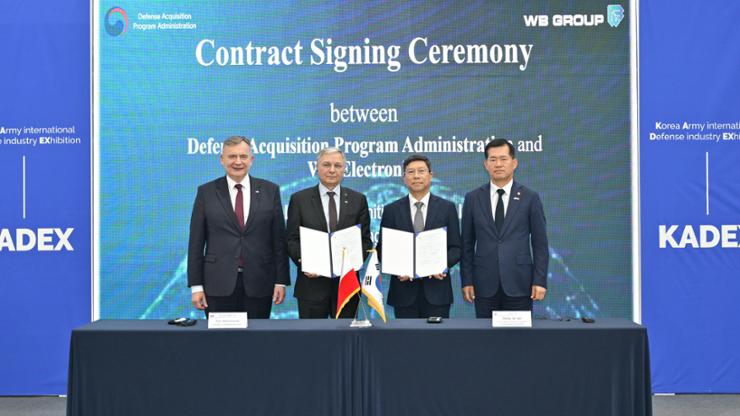WNAM REPORT: South Korea signed a deal with Poland to purchase suicide drones, Wednesday, marking a significant step in bolstering its unmanned aerial vehicle (UAV) capabilities amid escalating drone threats from North Korea.
The deal, marking the first instance of Seoul purchasing weapons from Warsaw, was part of an offset agreement — a reciprocal trade arrangement that benefits Poland, a significant buyer of South Korean defense systems.
According to the Defense Acquisition Program Administration (DAPA), South Korea agreed to purchase Warmate drones developed by Polish defense company WB Electronics, based on their proven effectiveness in the Ukraine war.
While officials did not disclose the exact number of drones or the price, reports suggest the purchase involves around 200 units. The drones are set for delivery in November, with deployment to Army units and the drone operations command expected by December.
The agreement was signed during the Korea Army International Defense Exhibition (KADEX), which began its five-day session earlier on Wednesday at the military headquarters in Gyeryongdae, South Chungcheong Province.
The Polish government initially proposed the sale in June, and South Korea finalized the decision in August.
In July, South Korean defense officials traveled to Poland to assess the performance of UAVs currently used by the Polish military, as well as the manufacturers’ production capabilities.
After reviewing several models, the officials deemed Warmate the most suitable option, as its active production line ensured immediate delivery upon signing the contract.
“The product was thoroughly verified by our team, including officials from the Army, the drone operations command, the Agency for Defense Development (ADD), and DAPA,” a defense ministry official said. “We determined it holds significant value for our use, and its capabilities have been proven in the Ukraine war.”
According to its manufacturer, Warmate drones have a maximum takeoff weight of 5.7 kilograms, an operational range of 30 kilometers, and an attack speed of 150 kilometers per hour. Measuring 1.6 meters by 1.1 meters, they are designed for easy transport and can carry various warheads, including high-explosive types.
The purchase highlights the increasing significance of cost-effective drones in modern warfare, as demonstrated by conflicts in Ukraine and the Middle East, where UAVs have proven to be game changers in aerial combat.
In the Ukraine war, a fleet of inexpensive drones, including some made of cardboard, has inflicted significant damage to Russia’s Su-27 fighter jets. In the Israel-Hamas conflict, both manned and unmanned UAVs have played a critical role in military operations.
The South Korean military currently operates thousands of drones, primarily to monitor North Korean artillery positions.
However, the rising threat of Pyongyang’s suicide drones has become a pressing concern for Seoul, especially amid speculation that the reclusive regime recently obtained these drones with assistance from Russia and Iran.
On Aug. 24, North Korea released photos of its leader Kim Jong-un overseeing a performance test of its purported suicide drones, with targets looking similar to South Korea’s K2 tanks.
Moreover, the drone purchase is expected to contribute to further strengthening ties with Poland, the defense ministry said.
In 2022, the European nation signed a $22 billion deal with South Korea to acquire K2 tanks, K9 self-propelled howitzers, FA-50 fighter jets, and Chunmoo multiple rocket launchers, marking South Korea’s largest arms deal with a single country to date.
These deals have also sparked interest from other nations, such as Romania, which has expressed a desire to expand its defense cooperation with South Korea.
“Currently, the Polish government is highly focused on expanding its weapons production capabilities, and South Korea’s purchase of Polish drones is a strategically beneficial move for both nations,” the official said.
South Korean Defense Minister Kim Yong-hyun met with Polish Vice Defense Minister Pawel Bejda during the KADEX event, where the two sides reaffirmed their commitment to defense cooperation based on the achievements to date.


